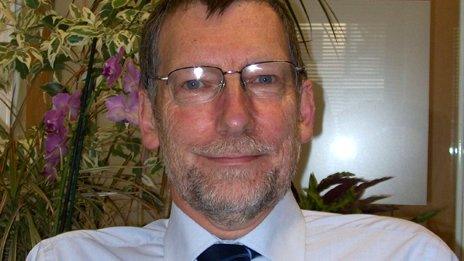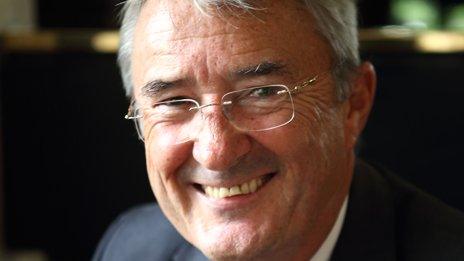Q&A: Prescription for rural health in Wales
- Published
We asked two leading doctors in Wales about the challenges for the medical profession in rural areas.


Dr Paul Myers wants to see telemedicine become easier to use
Dr Paul Myers, chairman of the Royal College of General Practitioners in Wales is a GP near Wrexham. More investment is needed in general practice and we hope that recent funding commitments, including a £10m primary care fund, will start to address some of the issues faced by general practice in Wales.
We need to work collaboratively to find ways to retain our GPs in rural parts of Wales and also to attract new talent to these areas and actively promote the quality of life on offer.
People want more services delivered closer to home and GPs are a key element to help deliver this. We also need to look at innovative ways of working, increasing the use and ease of telemedicine and expanding the practice family to include more practice nurses and pharmacists.
Moving forward, we need to help people self-manage simpler conditions and agree management plans for more complex conditions.
We need to establish mutual support in communities for caring, thereby giving GPs and staff more time to deal with those who need their specific professional skills.
Dr Alan Rees is the vice-president of the Royal College of Physicians and a consultant physician with specialist interests including diabetes. We represent doctors working across 30 different medical specialties across Wales, mostly in hospitals.
Last year, we published Rising To The Challenge, external in which we called for investment in rural and remote hospitals to improve patient care. We also made it clear that politicians and health boards must listen to patients and clinicians and allow them to lead change.
Without clinical leadership and genuine patient involvement, nothing will change in the long term.
One thing we know is that we need to look at the catchment area of a hospital when redesigning services and take into account issues such as geography, tourism, transport, population need and access to social care and rehabilitation.
Every hospital is different and clinicians must be encouraged and supported to come up with innovative solutions for their local area.


Dr Myers: Wales has the third lowest coverage of GPs per 10,000 population in the UK, we also have the second oldest GP workforce. The number of people aged 65 and over is projected to increase and this will have an impact on the number of long term conditions that GPs treat.
The number of patients reporting that it was "fairly difficult" or "very difficult" to obtain a convenient GP appointment in Wales has also risen - we need to see an increase in the number of training places in Wales by around 50 to replace GPs who are leaving as well as incentives to recruit and retain GPs.
The status quo is unsustainable; we estimate we will need up to 100 additional GPs per year over the next five years.

Dr Alan Rees says there are particular recruitment challenges in north and west Wales
Dr Rees: It is a huge problem for us. We are struggling to fill posts in hospitals right across the UK; the workload is extremely heavy and there are far too many rota gaps.
Worse still, many junior doctors currently feel isolated working in rural hospitals. The Welsh government needs to show leadership and focus on addressing recruitment challenges, particularly in north and west Wales.
This means developing a national medical workforce and training strategy with health boards, the Wales Deanery and the royal colleges.
Medical undergraduate and core medical training posts in Wales should be increased and junior doctors and medical students must be encouraged to stay in Wales with new training pathways in rural healthcare, an improved workload and more opportunities to take part in clinical leadership and quality improvement programmes.


Dr Myers: We do know there are practices in Wales employing pharmacists to undertake medicine reviews and look at more effective prescribing and some are working closely with their communities, offering social activity alternatives to prescribing medicines. Finally, there are examples of practices collaborating to share clinical expertise and administrative functions.

Dr Rees: Last year, the RCP launched the Future Hospital Programme, external, an exciting new three-year project which is working with clinicians and the NHS to put the patient right back at the centre of their care.
As part of this work, we have launched a major new UK-wide development sites programme and I was delighted when Betsi Cadwaladr University Health Board was selected as one of the first four sites.
Their project, Cartref, will give frail elderly patients and those with chronic illnesses the opportunity to have follow-up appointments closer to their own home via video clinics in primary care and community hospitals.
We strongly believe that the Welsh government should invest in rolling out telemedicine projects like this, which are being led by clinicians and patients.


Dr Myers: The pressures on GPs to deliver effective care are mounting, as is the need to deliver continuity of care and accessible services. The crisis of demand versus capacity in the health service is not new and it cannot be resolved overnight.
We need to work collaboratively to find sustainable solutions to increase workforce capacity and enable GPs to deliver the level of service their patients expect as well as taking on the challenge of providing more complex care, spending longer with patients and communities and taking on new roles and responsibilities.
If these issues are not addressed we will see longer waits for appointments in all parts of the NHS and possible delays of diagnosis and treatment.
Dr Rees: We all know that the NHS in Wales is facing a number of urgent challenges. Hospitals are struggling to cope with the combination of an ageing population and increasing hospital admissions.
All too often, our most vulnerable patients are being failed by a system that is ill-equipped and seemingly unwilling to meet their needs. The system is at breaking point.
That is why we need the next Welsh government to commit to the patient-centred Future Hospital model. This will require national leadership and a long-term plan for the future of the Welsh health service.
We need stability to support the change to new models of integrated care. For doctors, this will mean new ways of working, with more physicians visiting patients in the community, and more GPs working in hospitals.
We will also need to build stronger networks across hospitals and health boards. In a small nation like Wales, we have a real opportunity to lead change - and the time for action is now.